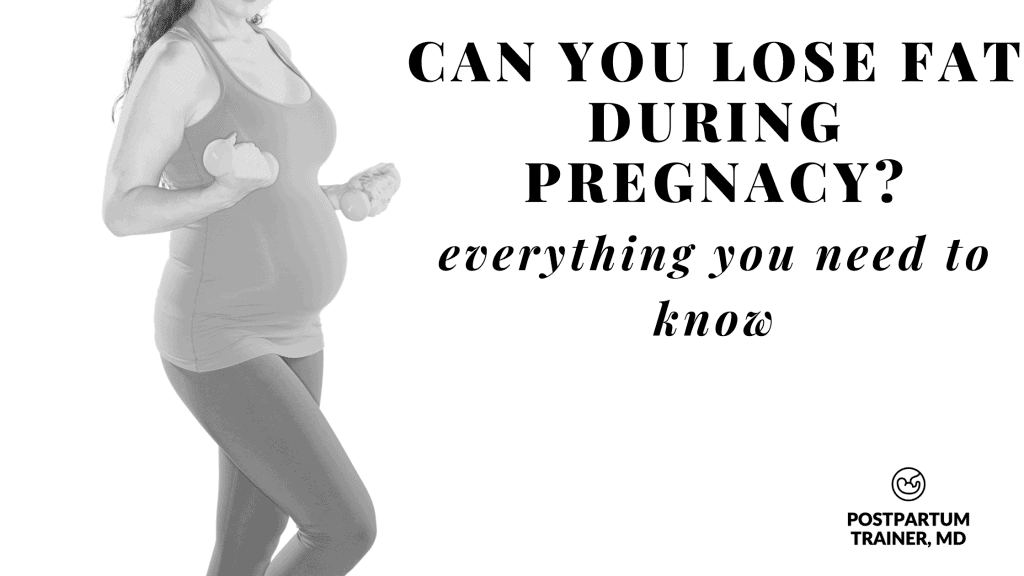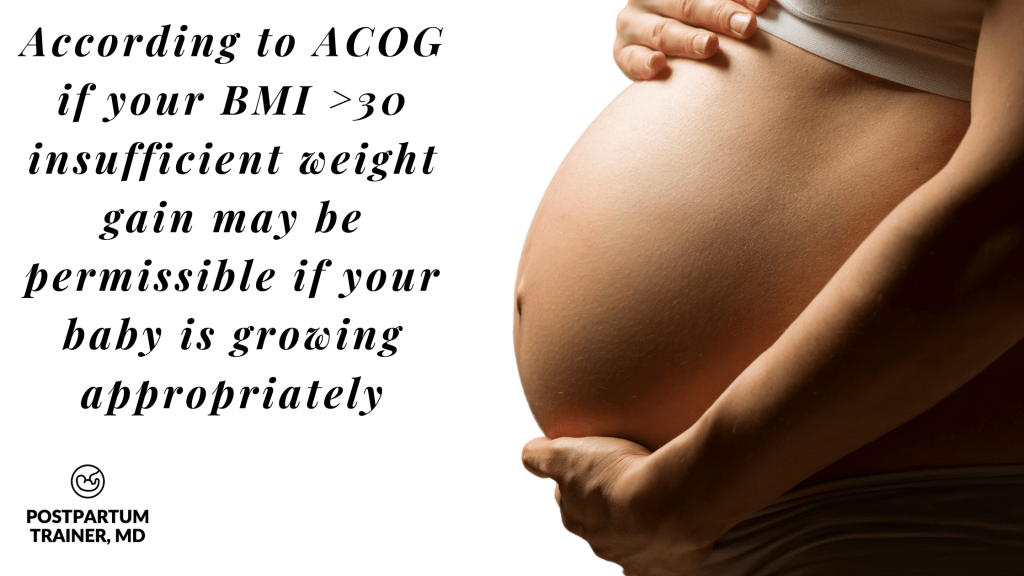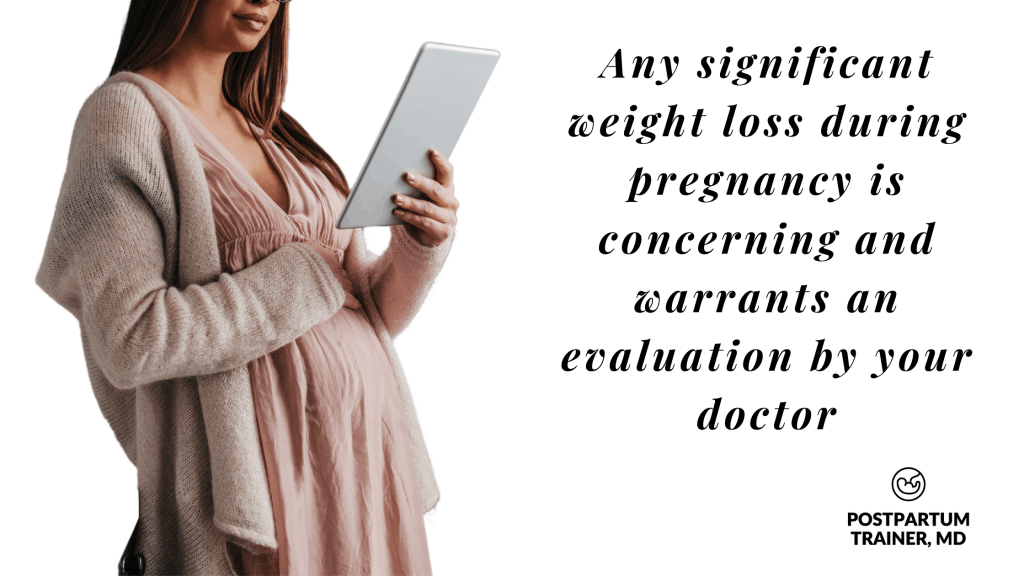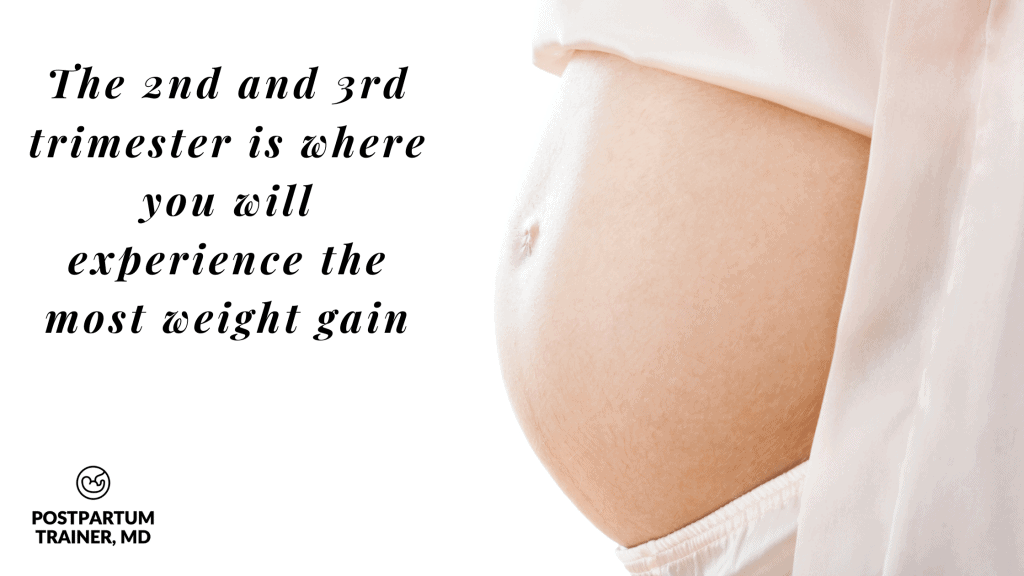Are you pregnant and feel like you’re gaining too much fat?
Is there is a safe and effective way to lose weight while pregnant?
In this article, you will learn everything you need to know about the safety of fat loss during pregnancy.
Let’s get started.

Can you lose body fat while pregnant?
There is almost no situation in which you should lose weight during the second and third trimesters of your pregnancy.
A 2015 systematic review and meta-analysis shows that women who lost weight during pregnancy have a 76% higher likelihood of having a small for gestational age baby (<10th percentile).
In general, an appropriate amount of weight gain is necessary to support your growing baby, regardless of your body mass index (BMI).
With that said, if you were overweight prior to pregnancy, you may be able to gain less weight than recommended as long as your baby is growing appropriately.
can you lose weight while pregnant if you are obese?
ACOG does not recommend weight loss in pregnancy regardless of your BMI.
So all in all: The official recommendation from the American College of Obstetricians and Gynecologists (ACOG) is against intentional weight loss during pregnancy.
What happens if you lose weight during pregnancy?
So, are there any negative effects of losing weight during pregnancy?
The most common risks associated with weight loss in pregnancy include:
- a small for gestational age infant (i.e. your baby doesn’t grow appropriately and has a low birth weight)
- spontaneous preterm birth
- and medically indicated preterm delivery
All of these conditions increase the risk of neonatal morbidity and complications.
However, it is important to note that we are talking about the second and third trimesters.
Unintentional weight loss during the first trimester is not uncommon.
More on that later.
How much weight can you safely lose during pregnancy?
There is no defined amount of weight loss that is safe to lose in pregnancy.
If your pre-pregnancy body mass index (BMI) was below 30 you should not lose weight during pregnancy.
If your pre-pregnancy BMI was greater than 30, a modest amount of weight loss might not have negative consequences, but the benefits do not outweigh the risks.
Be sure to follow closely with your health care provider if you experience pregnancy weight loss.
Your doctor will have to monitor the growth and development of your baby very closely with regular ultrasound checkups.

How to lose weight while pregnant
Understand that trying to lose weight while pregnant is risky and the growth of your baby can in jeopardy.
While I do not recommend intentional weight loss during pregnancy, I do recommend focusing on not gaining excessive weight.
Obesity during pregnancy increases your risk of every single major peri-and postpartum complication.
Let’s go over a few ways to do that.
Tips on how to prevent excess weight gain during pregnancy
Your healthcare provider will refer you to a nutritionist who will give you personalized information on what healthy weight gain should look like for you.
However, the following advice is beneficial for all pregnant women who want to live a healthy lifestyle.
Improving your nutrition
The number one thing you always have control over is your diet.
In order to not gain excessive weight, you must monitor your caloric intake.
Being pregnant does not mean that you need to eat for two people! Most women will only require about 300-500 extra calories in the second and third trimesters.
300-500 calories is a small snack.
You also want to make sure that your diet is primarily composed of nutrient-dense foods.
If you are interested in learning more about healthy eating and how to control your caloric intake during pregnancy, check out my Pregnancy Fit Diet.
Increase your protein intake
Consuming lean protein during pregnancy is important for the maintenance of maternal muscle tissue, as well as fetal tissue development.
Protein is the most satiating nutrient, which means that it will keep you full longer than the other two macronutrients.
During pregnancy, you should aim to consume 0.5-0.7g of protein per pound of body weight. For example, if you weigh 160lbs, you should try to consume 80-112g of protein per day.
Drink enough water
Staying hydrated is one of the easiest ways to not gain excessive weight during pregnancy.
You should NOT be drinking sugar-filled beverages from Starbucks, or Smoothie Queen.
I am talking about plain water.
In pregnancy, you should do your best to drink ~8 glasses of water per day which is equivalent to 64oz.

While you’re not eating for two – you should try and drink for two.
You could even try drinking a large glass of water right before a meal to keep your caloric intake in check.
What’s the best way to measure your hydration level?
Look at the color of your urine. If it is a dark yellow, you are dehydrated and need to drink more water! You always want your urine to be a pale yellow color.
Do resistance exercises
Exercise is another great way to maintain a healthy pregnancy weight, maintain lean muscle mass, and decrease your stress level.
Regular exercise helps burn calories while strengthening your muscles that get weakened during pregnancy.
Just be sure to check in with your doctor before starting any sort of exercise program.
To learn more about how to safely exercise in pregnancy, check out my post on Getting in Shape While Pregnant after you get clearance.
And if you did exercise prior to pregnancy, continue! This is the best time to keep your workouts going.
Use NEAT
Have you heard of NEAT? NEAT stands for non-exercise activity thermogenesis.
NEAT refers to the number of calories your body burns doing everyday activities. In other words, the more you move and fidget around, the more calories you will burn.
You can increase your NEAT by
- walking more,
- doing the dishes instead of using the dishwasher,
- fidgeting around while sitting,
- doing more physical activity, etc
Try to stay active for these 9 months and not be a couch potato!
Maximize your sleep
Sleep is extremely important in controlling your weight and minimizing fat retention.
Numerous studies have shown that sleep deprivation is associated with elevated cortisol levels, insulin resistance, and increased caloric consumption.
Obviously, sleep is much harder to get when you’re 6 months pregnant but just do your best. Make an effort to go to bed on time every day, even on the weekends.
Also, try to make sure that your room is pitch black and not too hot.
When should I worry about weight loss during pregnancy?
A small amount of weight loss (1-2 lbs) probably isn’t worrisome.
However, any significant amount of weight loss during pregnancy can be concerning and put you at increased risk of a very small infant and preterm birth.

Be sure to follow closely with your OBGYN and get a growth ultrasound when indicated.
If you are not gaining enough weight and your baby is not growing appropriately, then you will need to make dietary changes and increase the number of calories you are consuming.
How can I avoid getting fat during pregnancy?
The best ways to avoid gaining too much weight in pregnancy include:
- monitor the quantity and quality of the calories you consume,
- consume a well balanced diet with plenty of healthy foods,
- take your prenatal vitamins
- maintain adequate hydration,
- exercise on a regularly, and
- ensure you are getting enough sleep
The most common reason for excess weight gain during pregnancy is due to increased calorie intake, so you must ALWAYS pay attention to the amount of food you are consuming on a daily basis.
Try your best to keep junk food to a minimum and opt for nutrient-rich foods as often as possible. These include:
- Lean proteins (like chicken breast)
- Whole grains (like quinoa)
- Vegetables (like kale, broccoli, and spinach)
- Healthy fats (like avocado)
Can I get in shape while pregnant?
Yes, you can get in shape while pregnant. In fact, ACOG recommends that almost all pregnant women should exercise for up to 150 minutes per week.
I have an entire article on how to get in shape while pregnant through lifestyle changes. But as always, check in with your provider before doing any type of exercise routine.
Other Related Questions
Can you lose weight while pregnant in the first trimester?
Unintentional weight loss of 5 lbs or less in the first trimester is unlikely to have any negative impacts on your pregnancy.
The most common cause of weight loss in early pregnancy is due to morning sickness, which is common during the first 13 weeks.
Symptoms include nausea, vomiting, and sometimes weight loss due to the inability to eat or drink.
If you experience severe morning sickness and are losing a significant amount of weight in the first trimester, you may have a hyperemesis gravidarum. This condition may require IV fluid hydration, electrolyte replacement, and hospital admission.
The good news is, these medical conditions usually resolve by the 2nd trimester.
Can you lose weight while pregnant if you exercise?
It is unlikely that you will lose weight from exercising during pregnancy unless you make significant changes to your diet as well.
Your caloric intake will contribute to weight loss much more than exercise ever will.
Do you burn more calories when pregnant?
Yes, you burn more calories when you are pregnant because of the increase in weight and body surface area.
At baseline, your body has to burn calories just to keep your heart pumping, brain functioning, blood flowing, and muscles working. With an increase in body surface area, your body has to work harder to do these bodily functions.
In addition, your body has to expend additional energy for fetal growth.
What trimester do you gain the most weight?
You will notice your body weight will increase the most during the 2nd and 3rd trimesters.
You can expect to gain approximately 1 lb per week in the late second and third trimester.
However, overweight women can gain less weight as long as the baby is growing appropriately.

How can I lose belly fat during pregnancy?
There is no way to specifically lose belly fat during pregnancy. Instead, you should focus on engaging in regular physical activity, doing exercises to strengthen your core muscles, and avoiding excess weight gain.
This is the best way to increase your chances of having a belly-only pregnancy.
How can I lose arm fat while pregnant?
You can’t specifically lose arm fat- especially not during pregnancy. Instead, your goal should be to build arm muscle.
I have written an entire article on safe push-up variations during each trimester of pregnancy that you might find helpful, along with a full list of arm toning exercises you can do during pregnancy and postpartum.
How can I lose back fat while pregnant?
As I mentioned above, it is difficult to lose fat in a particular area. Studies have shown that you cannot spot reduce fat from specific parts of your body.
Instead, you can focus on building muscle which can help get rid of excess, unwanted fat.
I have an entire article on losing back fat postpartum that may be relevant.
Final words on Losing Fat During Pregnancy
Losing fat during pregnancy is not recommended and should not be done intentionally.
Instead, you should focus on avoiding excessive weight gain and trying to maintain a healthy weight / normal BMI before getting pregnant.
If you lose weight, make sure to be under close supervision from your doctor.
Now I want to hear from you.
How do you or did you avoid excessive weight gain during pregnancy?
Comment below and let me know!
Related Posts on losing fat during pregnancy
- The Fit Pregnancy Diet
- How to Pass The Gestational Diabetes Glucose Test
- What To Do If You Are Gaining Too Much Weight In Pregnancy
Get Four Free Workouts To Help Strengthen Your Pelvic Floor & Heal Your Mommy Tummy!

Brittany Robles, MD, MPH, CPT
Brittany Robles is a full-time OBGYN physician, a NASM certified trainer, and a prenatal and postnatal fitness specialist. She holds a Master of Public Health degree in maternal health with a special interest in exercise and nutrition. She is also the co-author of The White Coat Trainer. Learn more about her here.
Sharing is Caring – Send This To A Mom In Need!
References:
- Kapadia MZ, Park CK, Beyene J, Giglia L, Maxwell C, McDonald SD. Weight Loss Instead of Weight Gain within the Guidelines in Obese Women during Pregnancy: A Systematic Review and Meta-Analyses of Maternal and Infant Outcomes. PLoS One. 2015;10(7):e0132650. Published 2015 Jul 21. doi:10.1371/journal.pone.0132650
- ACOG: Weight Gain During Pregnancy Committee Opinion Number 548 January 2013
- ACOG: Obesity in Pregnancy. Practice Bulletin Number 230. June 2021
- Blomberg M. (2011). Maternal and neonatal outcomes among obese women with weight gain below the new Institute of Medicine recommendations. Obstetrics and gynecology, 117(5), 1065–1070. https://doi.org/10.1097/AOG.0b013e318214f1d1
- Bodnar, L. M., Siega-Riz, A. M., Simhan, H. N., Himes, K. P., & Abrams, B. (2010). Severe obesity, gestational weight gain, and adverse birth outcomes. The American journal of clinical nutrition, 91(6), 1642–1648. https://doi.org/10.3945/ajcn.2009.29008
- McCarthy FP, Lutomski JE, Greene RA. Hyperemesis gravidarum: current perspectives. Int J Womens Health. 2014;6:719-725. Published 2014 Aug 5. doi:10.2147/IJWH.S37685
- Fitzsimons KJ, Modder J, Greer IA. Obesity in pregnancy: risks and management. Obstet Med. 2009;2(2):52-62. doi:10.1258/om.2009.090009
- Hirotsu C, Tufik S, Andersen ML. Interactions between sleep, stress, and metabolism: From physiological to pathological conditions. Sleep Sci. 2015;8(3):143-152. doi:10.1016/j.slsci.2015.09.002
- Most J, Dervis S, Haman F, Adamo KB, Redman LM. Energy Intake Requirements in Pregnancy. Nutrients. 2019;11(8):1812. Published 2019 Aug 6. doi:10.3390/nu11081812
